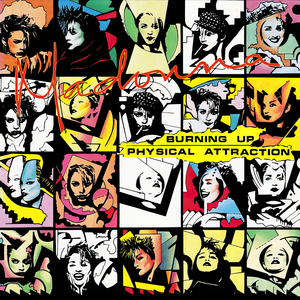
Madonna Louise Ciccone is an American singer, songwriter, actress, author, and record executive. Having been referred to as the "Queen of Pop" since the 1980s, she is regarded as one of the most impactful figures in popular culture. Madonna is noted for her continual reinvention and versatility in music production, songwriting, and visual presentation. She has pushed the boundaries of artistic expression in mainstream music, while remaining completely in charge of every aspect of her career. Her works, which incorporate social, political, sexual, and religious themes, have generated both critical acclaim and controversy. Madonna is often cited as an influence by other artists.

"Papa Don't Preach" is a song recorded by American singer-songwriter Madonna for her third studio album True Blue (1986). The song was written by Brian Elliot with additional lyrics by Madonna, who produced it with Stephen Bray. The song also appears remixed on the 1990 compilation album The Immaculate Collection and in its original form on the 2009 compilation album Celebration. The song's musical style combines pop and classical styling, and its lyrics deal with teenage pregnancy and the choices that come with it. It was based on teen gossip Elliot heard outside his recording studio.

"Don't Tell Me" is a song recorded by American singer Madonna for her eighth studio album, Music (2000). It was released as the second single from the album on November 14, 2000 by Maverick Records. Madonna co-wrote and co-produced the track with Mirwais Ahmadzaï, with additional writing from her brother-in-law, Joe Henry. Henry originally conceived it as a tango-styled torch song called "Stop"; the demo was later sent to Madonna, who then proceeded to change its musical composition, turning it into a country-dance song. Lyrically, Madonna asks her lover not to control her.

True Blue is the third studio album by American singer-songwriter Madonna, released on June 30, 1986, by Sire Records. She co-wrote and produced the entire album with Stephen Bray and Patrick Leonard. True Blue deals with her visions of love, work, dreams as well as disappointments, and was inspired by her then husband Sean Penn, to whom Madonna dedicated the album. Musically, the songs on the album took a different direction from her previous endeavours, incorporating classical music in order to engage an older audience who had been skeptical of her music.

Music is the eighth studio album by American singer Madonna, released on September 18, 2000 by Maverick and Warner Bros. Records. Following the success of her previous album Ray of Light (1998), she intended to embark on a tour. However, her record company encouraged her to return to the studio and record new music before going on the road. Her collaboration with producers Mirwais Ahmadzaï and William Orbit resulted in a more experimental direction for the album. Music has an overall dance-pop and electronica vibe, with influences from rock, country and folk. The album was mostly recorded at Sarm West and East Studios in London, England. Elaborating a country theme for the album, Madonna reinvented her image as a cowgirl.

The Drowned World Tour was the fifth concert tour by American singer-songwriter Madonna in support of her seventh and eighth studio albums Ray of Light and Music, respectively. The tour began on June 9, 2001 in Barcelona, Spain and ended in Los Angeles, California on September 15 of the same year.

"Music" is a song recorded by American singer Madonna as the title track for her eighth studio album (2000). It was released as the lead single from the album on August 21, 2000 by Maverick and Warner Bros. Records. "Music" was inspired by a Sting concert Madonna attended and was written and produced by her with Mirwais Ahmadzaï. It is a disco, electro-funk and dance-pop song in a static key of G minor. Madonna's vocals are electronically manipulated in the track, with the lyrics having political and social undertones and reiterating the uniting power of music.

"What It Feels Like for a Girl" is a song recorded by American singer Madonna for her eighth studio album Music (2000). It was released as the third and final single from the album on April 16, 2001, by Maverick Records. Madonna and Guy Sigsworth wrote and produced the song with David Torn as co-writer, and Mark "Spike" Stent as a co-producer. "What It Feels Like For a Girl" is a mid-tempo electronic and synth-pop song, with filtered bass licks, tidal keys and pads as part of its instrumentation. Lyrically, it conveys society's double standard toward women, addressing hurtful myths about female inferiority. To emphasize the message, the song opens with a spoken word sample by actress Charlotte Gainsbourg from the 1993 British film The Cement Garden. A Spanish version of the track, "Lo Que Siente la Mujer", was translated by Alberto Ferreras and included in the Latin American edition of Music.

"Beautiful Stranger" is a song recorded by American singer and songwriter Madonna. It was released on May 19, 1999, by Maverick and Warner Bros. Records as a single from the soundtrack of the film, Austin Powers: The Spy Who Shagged Me. Madonna co-wrote and co-produced the song with William Orbit. The soundtrack for Austin Powers: The Spy Who Shagged Me was a much expected release and Madonna's song was chosen by the album's executive producers to promote it. "Beautiful Stranger" has appeared on two separate Madonna greatest hits collections: GHV2 (2001) and Celebration (2009). Musically, "Beautiful Stranger" is a psychedelic pop and disco song that features heavily reverberated guitars and bouncy drum loops. Its lyrics tell the tale of a romantic infatuation.

"Lucky Star" is a song written and recorded by American singer Madonna for her eponymous debut album Madonna (1983). Sire Records released it as the fourth single from the album on September 8, 1983. The song was produced by Reggie Lucas, but Madonna was not impressed by his final version. She called her then-boyfriend John "Jellybean" Benitez to remix the track according to her ideas. "Lucky Star" is a medium-paced dance track and combines the heavy beats of a drum with the sounds of a guitar played in a high riff. The lyrics juxtapose the male body with the heavenly stars in the sky.

"Holiday" is a song recorded by American singer Madonna for her eponymous debut album Madonna (1983). Sire Records released it as the album's third single on September 7, 1983. Written by Curtis Hudson and Lisa Stevens of Pure Energy, the track was offered to Madonna by her producer John "Jellybean" Benitez when she was looking for a potential hit track to include on her debut album. After accepting the song, she and Benitez worked on it and altered its composition by the addition of a piano solo performed by their friend, Fred Zarr. "Holiday" features instrumentation from guitars, electronic handclaps, a cowbell, and a synthesized string arrangement, while its lyrics speak about the universal sentiment of taking a holiday.

"Burning Up" is a song by American singer Madonna included on her 1983 debut album, Madonna. It was initially released as a single on March 9, 1983. The song was presented as an early recorded demo by Madonna to Sire Records who green-lighted the recording of the single after the first single "Everybody" became a dance hit. Madonna collaborated with Reggie Lucas, who produced the single while John Benitez provided the guitar riffs and backing vocals. Musically, the song incorporates instrumentation from bass guitar, synthesizers and drums, and the lyrics talk of the singer's lack of shame in declaring her passion for her lover.

"Everybody" is the debut single by American singer Madonna, released on October 6, 1982, under the label Sire Records. The single was featured on her eponymous debut studio album Madonna (1983). Madonna had recorded a demo of the song with Steve Bray. She urged DJ Mark Kamins, who played at her dance club, to play it. He was impressed by the song and took her to Sire Records, who signed her for a two-song deal. However, after the recording of the two singles was over, Sire executive Michael Rosenblatt was not interested in the other song produced and decided to release only "Everybody".

"Fever" is a song written by Eddie Cooley and Otis Blackwell, who used the pseudonym John Davenport. It was originally recorded by American R&B singer Little Willie John for his debut album, Fever (1956), and released as a single in April of the same year. The song managed to top the Billboard R&B Best Sellers in the US and peak at number 24 on the Billboard pop chart. It was received positively by music critics and included on several lists of the best songs during the time it was released.

"Live to Tell" is a song by American singer-songwriter Madonna. It was released as the lead single from Madonna's third studio album True Blue (1986) on March 26, 1986, by Sire Records. It later appeared on compilation albums The Immaculate Collection (1990), Something to Remember (1995), and Celebration (2009).

"Love Don't Live Here Anymore" is a song written by Miles Gregory and originally recorded by Rose Royce. It was produced by former Motown songwriter and producer Norman Whitfield for Whitfield Records. Lead vocals were sung by Gwen Dickey and the song was released as the second single from their third studio album Strikes Again. The song was developed as a result of producer Whitfield's interest to work with Paul Buckmaster, the British arranger and composer. Together they asked songwriter Miles Gregory to write a song for them. Gregory's undergoing medical care for his deteriorating physical health became the inspiration behind the song. "Love Don't Live Here Anymore" incorporated the use of the Electronic LinnDrum machine, and was one of the first songs to effectively use the sound reverbs of the instrument. The song was mainly recorded at music contractor Gene Bianco's house, where Dickey was present during the recording.

"Open Your Heart" is a song by American singer Madonna from her third studio album True Blue (1986). It was released as the album's fourth single on November 19, 1986 by Sire Records. It has since appeared remixed on the compilation albums The Immaculate Collection (1990) and Celebration (2009). Originally a rock and roll song titled "Follow Your Heart", it was written for singer Cyndi Lauper by songwriters Gardner Cole and Peter Rafelson. Looking for new songs for True Blue, Madonna accepted it. She and Patrick Leonard transformed it into a dance-pop song. "Open Your Heart" is an innuendo-laden love song where Madonna expresses her sexual desire.

The Re-Invention World Tour was the sixth concert tour by American singer-songwriter Madonna, in support of her ninth studio album American Life. The tour began on May 24 in Inglewood and ended on September 14 of the same year in Lisbon. Additionally, it marked Madonna's first concerts in Portugal and Ireland.

I'm Going to Tell You a Secret is the first live album by American singer and songwriter Madonna, containing songs from the documentary of same name. The film chronicled the behind-the-scenes of Madonna's Re-Invention World Tour (2004), and was directed by Jonas Åkerlund. The album was released on June 20, 2006, in a two-disc format, a CD with 13 songs from the show plus a demo from her tenth studio album Confessions on a Dance Floor (2005), and a DVD with the documentary film. The documentary and the album were also released as digital download to the iTunes Store.
"Impressive Instant" is a song by American singer-songwriter Madonna from her 2000 studio album Music. Originally intended to be the fourth single of the album, the release was cancelled due to a disagreement between Madonna and her recording company. Finally Warner Bros. released it in the United States as a promotional single on September 18, 2001. Written and produced by Madonna and Mirwais Ahmadzaï, the track is bright and uplifting in its content and composition. It was the first song that Madonna and Ahmadzaï worked on and recorded. Ahmadzaï had to work separately on his laptop to generate the sound elements which Madonna wanted in the song, since it was difficult to generate the music in the recording studio. "Impressive Instant" has been described as a club-savvy acid techno, pop-trance, electropop and electro house stomper containing futuristic keyboard lines, with Madonna's vocals being distorted and robotic. Backed by laser noises and synths, the song's lyrics deal with love at first sight, and contains somewhat absurd, nonsensical lyrics.


















